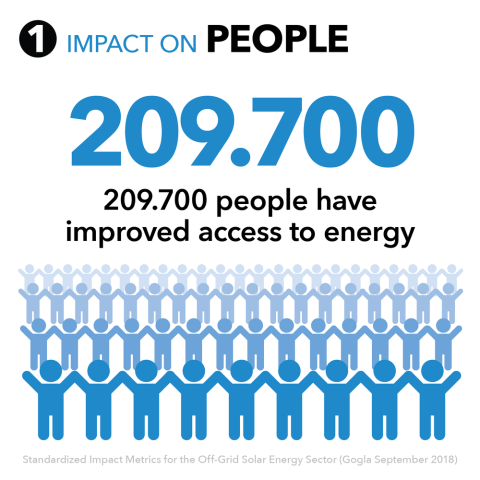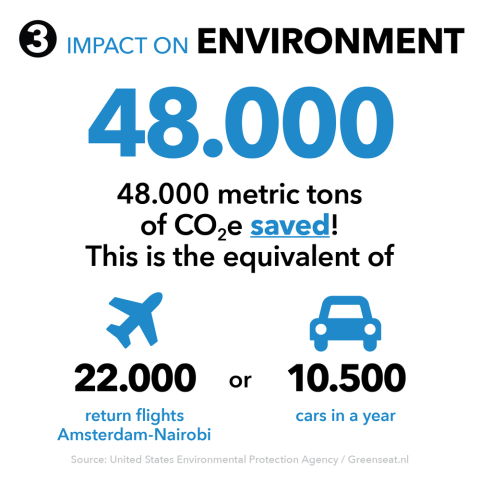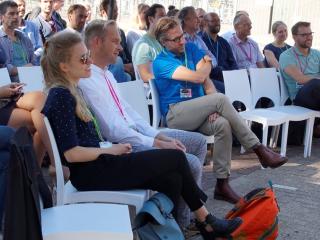A spark of passion reaches Africa
The idealistic entrepreneurial trio Harmen van Heist (34), Marcel van Heist (32) and Evan Mertens (33) are almost bursting with energy. The mission of their social enterprise is to bring light to the darkness, through handy ‘Solar Home Systems’ for neglected rural areas in Africa that have no electricity. By helping to solve these energy problems they hope to reduce inequality in the world. Rural Spark is not just the company’s name: it’s a spark of passion.
A few years ago Harmen, a graduate of Organization Studies at Tilburg University, his brother Marcel, and his fellow student Evan from Eindhoven University of Technology, started work on an LED lamp project for rural India. Since then, many experiences wiser, the start-up has developed further and the spark has jumped to Africa. The three idealists operate out of Tilburg University campus with a clear social aim (Bringing off-grid solar energy to Africa), but they also want it to earn money. They hope to get into the black by 2020. Sun-win/win-profit
In Africa small steps can have so much more impact, tackle inequality, and bring about change. I caught the spark!
At the time, lecturer Patrick Vermeulen focused in his lectures on the challenges of doing business in emerging markets. Harmen: "What I found super interesting was the difference you could make. In Africa small steps can have so much more impact, tackle inequality, and bring about change. That really excited me. I caught the spark! In my graduation project at the Ministry of Foreign Affairs I focused on Private Sector Initiatives, and after that I started my own initiative: Rural Spark.”
First energy kit at a hairdresser
The modular ‘energy kit’ consists of a solar panel (energy capture), a router (energy transformer and service platform), and a battery (energy storage). USB ports on the router and the battery allow a variety of equipment to be connected, such as LED lamps, mobile phones, computers, ventilators, radios, TVs, or a fridge. In Nigeria a pilot project has been started at a hairdresser’s, where the kit is used to charge clippers. There is an important concomitant advantage: existing, pollutant forms of energy (such as wood, kerosene, diesel oil, petroleum) can be replaced. The kit is therefore also cleaner, more climate-friendly (no extra CO2), safer and cheaper.
We have people in Africa, India and China, but the entire management and coordination is done from the Tilburg University campus.
From India to Africa
The projects in India went reasonably well to start with, but India turned out not to be the promised land, partly thanks to continual interference from the authorities, who wanted sole control of the energy supply. In Africa there was evidently more room for ‘the market’, so Rural Spark is now focusing entirely on countries like Benin, Senegal, Congo DRC, Nigeria, Uganda and Zambia, and especially on areas with no electricity network. The company is working together with local partners and African distributors.


10,000 starter kits for 100,000 Africans
This is a potential market of an estimated 580 million Africans. Rural Spark has the kits manufactured in India, and this year the company expects about 10,000 to be produced, enough to help about 100,000 Africans. A starter kit costs about $200. Turnover in 2019 was almost $2 million. Turnover is expected to triple by 2020, with sales of 45,000 kits – even though global competition is strong, with 14 other suppliers. Rural Spark is therefore actively seeking the Lighting Global certification that would improve market acceptance.
Easy to expand and spread payment
Rural Spark plans to beat the competition with two unique selling points: the modular character of the kit, and an intriguing credit scheme. A small starter kit for lighting or electricity can easily be expanded later on, with an extra battery for instance, providing energy for extra devices (fridge, TV). And payment can be made in installments, since purchase outright is often a problem in Africa, despite the low price point. The payment plan is handled by Dutch partners. Local kit distributors, too, can buy kits without having to pay the full price up front. The company also promotes local entrepreneurship, and engages in ‘e-waste’ – the recycling of written-off kit components.

Contact and service via the router
A service and retail platform (via the router) tracks payments, activates the system, provides service, facilitates advertising campaigns, makes cash flows transparent to distributors, enables direct interaction with the customer and provides real-time management reports. The platform is integrated with local mobile payment systems and digital mobile purses, using secure payment methods that are known locally. Customers receive tokens automatically after payment via SMS messages. The service platform also offers the possibility to switch off systems remotely in case of non-payment.
How exactly does it work, cloud-based payments? Harmen explains: "Payments are indeed made through local providers of 'wallets', comparable to PayPal. Mobile money is really big overthere. Everyone is paying mobile and via local providers. We integrate this service into our cloud-based service platform, so payments are made through the existing and well-known 'mobile wallets' of local providers (e.g. Vodacom) and we can check it on our Service Platform. It's all digital."
Rural Spark is deliberately aiming at the poorest groups of people, those living on about $2 a day
Rural Spark aims at the poorest groups
Rural Spark is deliberately aiming at the poorest groups of people, those living on about $2 a day. For a family of five with an average monthly income of $290, a monthly installment of $10 is quite feasible – especially if money no longer needs to be spent on wood, kerosene or petroleum. The monthly installment amount varies per country and per distributor. In one country customers might pay six monthly installments of $40; in another it might be $10 per month for two years. But the kit is eventually their sole property.

Crowdfunding for further investment
Rural Spark hopes that crowdfunding will raise the €600,000 they need (with almost €500,000 raised so far!) to invest further in the production of the kit and the service platform, and to be able to work more closely with local distribution partners so that turnover can increase and even more Africans can get access to clean electricity. Investors are promised a 6% return on subordinated debt. Investment is not risk-free, as in Africa there is always the possibility of political and economic problems.
We’re skipping the whole fossil phase, just like they went straight to mobile phones. So why not make the energy transition there sustainable, too? We can really make the difference!
On campus
Rural Spark is located in the Intermezzo building on the Professor de Moorplein, near Braventure, a start-up platform for Brabant. Harmen: "It suits us fine, but this summer we’ll be moving to larger premises so that we can expand the team. In the longer term we’d like to move to the booming Spoorzone, because of its ‘collective spark’ and its better accessibility. Rural Spark will continue to operate out of Tilburg. We have people in Africa, India and China, of course – but the management and coordination happen in Tilburg.”
Tilburg University and energy transition
Could Tilburg University still mean something to Rural Spark in relation to the energy transition? Harmen: “I think so, yes. However, you do often see that this kind of initiative is directed towards the Netherlands and Europe. Makes sense, but it’s why we don’t often connect. We are focusing on Africa because enormous growth is taking place there. We can achieve so much more there than we could here in the Netherlands. And we’re skipping the whole fossil phase, just like they went straight to mobile phones. So why not make the energy transition there sustainable, too? We can really make a difference.”
About Rural Spark
Photography/Infographics: Rural Spark
Date of publication: 28 August 2019



